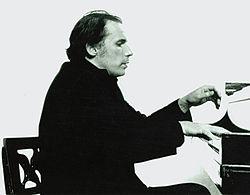It was a moment of joy, to suddenly recall Glenn Goulds constant humming, while I was having some thoughts and doing brainstorming within myself about the idea behind the project eat drink think sing. I thought of possible artistic and contents connections. This great pianist sung always and – as he said – subconsciously, he always had to sing.

Glenn Gould
Just as many individuals who perceived much, carried much inside of them, wanted to express much and apparently had also much to say, he died too early. Nevertheless, he played different roles – with much praise and with much criticism. He played the role of the Dean, of the British conductor Sir Nigel Twitt-Thornwaite, of the taxi driver Theodore Slutz from Brooklyn Heights, New York and of the German composer and critic Dr. Karlheinz Klopweisse. He sung almost always, precisely in the moment, in which we did not want to hear his voice. But most of all, he played – with much praise and criticism – the piano.
His posture was awkward, for most pianist actually impossible. During his youth his piano teacher suggested, it would perhaps be better for him to stroke the keys, instead of hitting them. For this, a very different position was necessary at the piano bench.
That he sung during his piano playing would certainly be enough information to dig into the ideas and systems of psychology. I prefer, however, to make connections to the ecstasy of being.
Glenn Herbert Gold was born in Toronto Canada on the September 25th of 1932. To avoid the connection being made to Judaism, the family had their name changed to Gould in 1939. Whenever he was asked, if he was a Jew, his answer was: ‘only during the second world war’. His great-great-great-grandparents on his mother’s side were also the grandparents of Edvard Grieg. He obtained his initial piano lessons from his mother, and although his parents wanted to give him a ‘natural’ childhood before going into the music business, at the age of thirteen he was already earning money through music and gave his first piano concert at the age of fifteen.
After a very lively life of music he retired from the stage and gave his last concert in 1982. As of then he dedicated himself to doing various music recordings and to writing.
Shortly before turning fifty, he died as result of a stroke.
A short – relatively – but active and energetic life.
*
Additional reading:
- Glenn Gould Archive at the Library and Archives Canada

